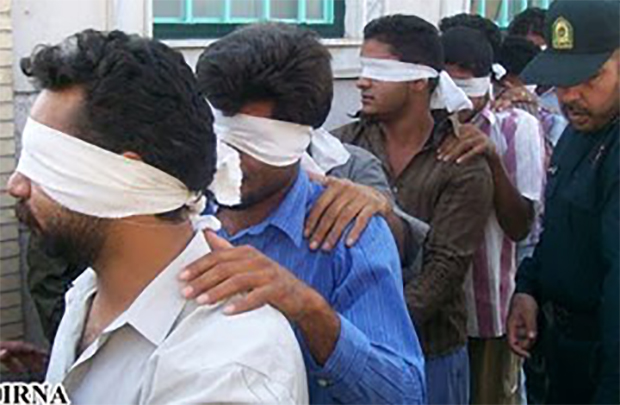
According to Karim Dahimi, the Ahwazi human rights activist, Eighty-four Ahwazi Arab youth citizens have been arrested since 6 April, 2014by the regime security forces while the reason of their arrest and their whereabouts is still unknown.
He said that the police security forces have not shown any authorization for the arrest of these Ahwazi Arab youth who were arrested in their homes and also in their work place even without receiving any oral charges by the security agents. The arrestments of Ahwazi Arab activists frequently are carried out by arbitrary house searches without warrant, charges or trial; he said.
He also pointed out that “although the security police agents have not commented the cause of the arrest of these Arab youth citizen but we are quite sure the reason for their arrests is just because of approaching the ninth anniversary of the Ahwaz popular uprising of April 2005”.
Mr. Karim Dohimi added that in a preemptive operation the Iranian regime authorities arbitrarily detain the Ahwazi Arab civilian to circulate more panic and suffocation among Ahwazi Arab people to curb their participation for commemorating the ninth memory of April 15 Uprising in different Ahwaz cities.
In the most recent arrests, totally 84 Ahwazi Arab citizens were arrested in different cities where 40 youth were arrested in Ahwaz capital and its outskirt, 10 youth in Abadan, 10 in Falahyah, 15 youth in Mahshour and 9 citizen from Talbomeh village who were all arrested by security forces and have not been released so far.
It should be noted that, On April 15, 2005, thousands of Ahwazis protested against Iran’s ethnic cleansing policies in Ahwaz region in the south and south west of Iran. The peaceful intifada or uprising was very successful at first, but then the vampire regime sent in security forces and at least 160 people were killed, and thousands were arrested by the regime’s anti-riot forces.
Further background of Ahwaz intifada or uprising:
Since the Ahwaz popular uprising in 2005, the death sentences and executions are being imposed and carried out on Ahwazi prisoners extensively, after procedures that violate human rights standards. In the previous years the death sentences are being flung out after grossly unfair trials relying on Confessions obtained under tortures. Many trail of those Ahwazi victims who sentenced to death failed to meet the international standards for fair trails, including by using “confessions” obtained under tortures or other ill-treatment as evidence against the defendants.
For changing the demography of Ahwaz region, Iran has been waging silent war against Ahwazi Arab people by constructing exclusive settlements aim as systematic policy of ethnic cleansing within clandestine frame-time. In 2005 it was revealed that the central government had been pursuing a plan of requisitioning land from Arabs in Al-Ahwaz and selling it to ethnic Persians and non-Arab businesses with zero percent loans. The displaced Ahwazis remain undercompensated, and have been forced to relocate to shanty towns in the regional capital, Ahwaz. Some Ahwazis have even been deported across the country to the northeastern city of Mashhad. A government document revealing these plans and other Persianization methods was discovered in 2005 and led to massive protests and unrest in Al-Ahwaz. The popular April uprising of 2005 was in fact a turning point for Ahwazi Arab people in their fighting for their national rights when they managed to lift the lid of oppression of regime oppressive policies perpetrating against Ahwazi Arab for years. Thus, this continued reactionary policy of Iranain regime left no space for Arabic culture and Arabic heritage of Ahwazi people in their homeland.
Author: Rahim Hamid
Publisher: Rojhelat.info

